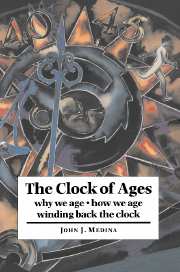INTRODUCTION
Published online by Cambridge University Press: 05 August 2012
Summary
Our first task in the beginning of this book is to attempt to define the process of aging. By the end, you will find this task will be mostly unaccomplished.
The reason for this ambiguity is manifold, and perhaps surprising. The problem is that there are so many ways to look at the roots of biological maturity. Some look to aging's final obligation, death, and attempt to work backwards from the event to describe what aging means. But even death can be difficult to define absolutely, in an it–makes–sense–to–thebiologist language. We will understand this ambiguity best by attempting a definition of our own. And we will do so in the same backwards style, first examining the process of death and then working our way in reverse.
A working definition
At first blush, the inability to define death, and the body's prior preoccupation with survival, might sound odd. We have no ambiguities, for example, surrounding the material facts of such notable nonagenarians as the playwright George Bernard Shaw.
- Type
- Chapter
- Information
- The Clock of AgesWhy We Age, How We Age, Winding Back the Clock, pp. 1 - 6Publisher: Cambridge University PressPrint publication year: 1996



